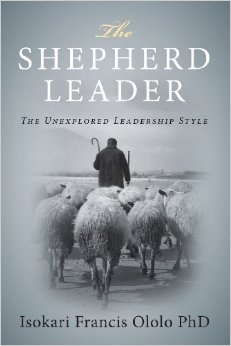The Shepherd Leader
The Unexplored Leadership Style
This faith-based approach to leadership offers a unique perspective, distinguishing it from other business leadership books.
Leadership is an oft-visited topic, but few writers break out of the traditional mold of telling stories about leaders and conveying tips for leading effectively. Isokari Francis Ololo, who holds a PhD in management, takes a novel approach with a book that extols the principles of sound leadership within a biblical context. “The shepherd leader,” writes the author, “envisions where the flock (the led) should be going and ensures that they arrive safely. The shepherd thus serves as a vision purveyor and an actor at the same time.”
While the notion of a business leader as a shepherd is unique, Ololo heavily relies on relevant passages from both the Old and New Testaments of the Bible to validate his premise. Not surprisingly, he begins with the well-known Psalm 23 to put forth the argument that “the shepherd leader guides a group of people with the power of influence bestowed or conferred upon him.”
Throughout the book, Ololo very deftly weaves together examples of shepherd leadership with biblical excerpts, making for a powerful faith-based presentation. He suggests, for example, that the shepherd leader make use of both the rod and the staff referenced by King David. “For a shepherd leader,” writes Ololo, “the rod means power to sanction the led, while the staff means influence and power applied for the benefits of the people.”
In each chapter, Ololo addresses aspects of leadership, such as leadership styles, the attributes of leaders, and tools the leader can use to resolve conflict, including negotiation, mediation, and diplomacy. In one of the more compelling chapters, titled “Parenting and Profligacy,” the author suggests that being a shepherd leader involves “leading with the heart of a parent—a heart of compassion.” He draws interesting comparisons between a leader’s flock and a parent’s children. Later in the chapter, Ololo laments the fact that, in contrast to the shepherd leader, there are “profligate leaders” who today “focus on reward rather than service.” This portion of the text could easily relate to some modern-day CEOs.
Ololo writes well and does a masterful job of employing biblical references to his advantage. Clearly, the author believes leadership should be divinely inspired. The shepherd leader, writes Ololo, “surrenders to the dictates of divine guidance.” This may be the one aspect of the book that limits its appeal to a broader audience. Readers who prefer a more secular approach may balk at the tight connection Ololo makes between leadership and the will of God. Still, there are many useful and applicable lessons to be learned from reading The Shepherd Leader.
Reviewed by
Barry Silverstein
Disclosure: This article is not an endorsement, but a review. The publisher of this book provided free copies of the book and paid a small fee to have their book reviewed by a professional reviewer. Foreword Reviews and Clarion Reviews make no guarantee that the publisher will receive a positive review. Foreword Magazine, Inc. is disclosing this in accordance with the Federal Trade Commission’s 16 CFR, Part 255.

